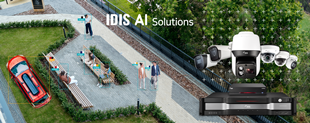27/10/2007
DVTel software helps manage Brisbane traffic centre
Ridgefield Park, NJ (USA)
Brisbane City Council (BCC), BCC is the largest council in Australia, serving a population of around two million sprawling across 1367 square kilometres. The BCC draws on a number of different agencies handling elements of Brisbane's transport system, including roadways and public buses. Historically each of these separate departments maintained their own surveillance systems.
The DVTel solution is designed to deliver to the BMTMC multiple live video feeds and to effectively display them to support multiple teams of operators in a single control room. The key is that traffic and emergency issues are only relevant in real time. When Brisbane Traffic Center operators are wrestling with early morning congestion caused by a breakdown, they use the DVTel live image streams of adjacent agencies to establish causes that might not be clear from their own cameras. They are also seeking out uncongested alternative routes. At the same time, the Busways network has priorities based on safety and security. While its cameras are available for viewing by the other two agencies, Busways also maintains a strong focus on security of assets and safety of travellers on the Busway system.
While the independent surveillance operations worked well for many years, recently it became clear that a single digital "super control room" incorporating all cameras and allowing all image streams to be viewed by all agencies would provide significant benefits in terms of reduced cost and operational efficiency. To integrate the different systems and cameras into one command center was no small operation. BMTMC serves a total road network of 6500 km, equipped with 1450 sets of traffic lights, 340 help phones and 75 variable message signs. Supporting these elements are 180 CCTV cameras. The BMTMC also incorporates the Busways (Translink) system with 15 Busway stations. The entire Busay system is viewed by 280 fixed and PTZ cameras on a dedicated optical fibre network.
According to Michael Corne, BMTMC director, the new BMTMC control room, with its DVTel integrated CCTV network, offers a range of key benefits including a single point of contact for real time transport operations and a single consistent source of traffic information. The network structure of the BMTMC to a large extent mirrors the geography of the joint partnership. There are three core DVTel external CCTV networks that form the heart of the BMTMC integrated solution. First there's the existing digital solution of the Brisbane City Council. Next comes the Main Roads network and finally the Queensland Transport Busways system.
The majority of cameras in the network are legacy analog technology. The transport of these analog cameras is a mixture of direct copper and optical fiber to the IP Video encoders. BCC has 100 PTZ cameras, Main Roads has 80 cameras, and Busways 280. The analog cameras are encoded in the field to produce MPEG 2 and MPEG 4 IP video streams for viewing and recording. Transportation of these IP video signals is a mix of direct-connect to the optical fibre network or DSL links to the archiver - with all images multicast to the BMTMC. All operators employ DVTel client workstations connected to the LAN. At the same time the various traffic controllers access video streams from the fiber LAN and display these images onto what is probably Australia's largest video wall.
Scott Perkins from Pacific Communications believes there's no other system in Australia that links multiple CCTV systems like the BMTMC solution. He says that the use of the DVTel solution means the overall BMTMC system unites three individually-managed networks in a central control room with real time on all inputs. "Thanks to the flexibility of the DVTel management solution, each agency can have its own staff in a state of the art joint control room where they're able to share real time intelligence, react more quickly and better manage emergency responses." And the most critical benefit? "Importantly, the digital network architectures and DVTel technology provide a future proof solution to accommodate planned future growth and integration"

















